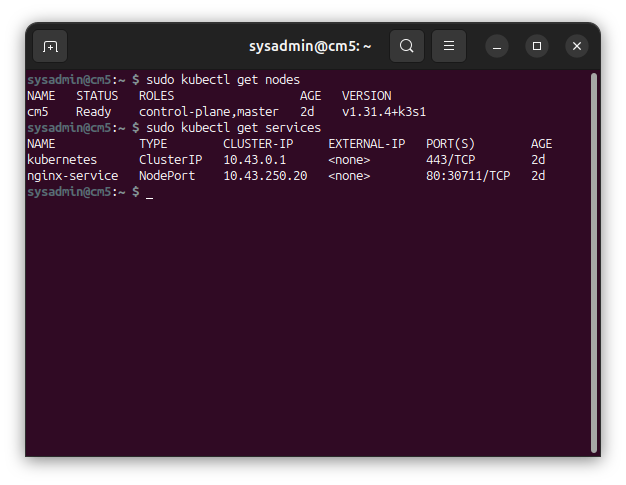Setting up the Dev Server
The next step was to configure the CM5 itself as a development server. I installed all the relevant packages on the CM5:
sudo apt install build-essential git mariadb-server nginx php lua nodejs docker.ioI decided against installing Vim, because I much prefer to build it myself from src and configure it as an IDE (more on that another time).
I started docker, set up docker compose and created a user group for it
sudo usermod -aG docker ${USER} then installed kubernetes lite (k3s) through curl:
curl -sfL https://get.k3s.io | sh - configured it to my needs and deployed my first container, a simple nginx server just to test everything was working correctly. I write scripts for simple tasks, so I wrote a script to deploy K8s dependent on what I need it for so the command was:
./deploy_k8s.sh nginx 80This deployed nginx on port 80.
To connect to the Dev Server/Home Dev Network, I would use ssh tunnel and connect on my main machine using:
ssh -L 8080:localhost:80 sysadmin@cm5.localAfter running Kubectl and seeing the master node (CM5) and a service (nginx), success was evident.

Zero Time
Now it’s time to set up the Zero as a data forwarder. This is incase the CM5 ever goes offline, and data/projects are sent to each other. After trying to run apt update/upgrade I ran into issues with update-initramfs, the workaround is to simply go edit your conf:
sudo nano /etc/initramfs-tools/initramfs.confand update MODULES from dep to most
MODULES=mostupdate it:
sudo update-initramfs -uthen reconfig dpkg:
sudo dpkg --configure -aAll fixed.
Now back to installing the Zero as a data forwarder, this will forward data from the cm5 to the zero in an outage/downtime and I’ll use rsync, bash and cron for this.
On the Zero I created a script:
#!/bin/bash
# data_cm5.sh
SOURCE_DIR="/home/sysadmin/dev" # CM5's dir
DESTINATION_DIR="/home/sysadmin/dev-cm5" # Pi Zero's dir
REMOTE_USER="sysadmin" # Username on CM5
REMOTE_HOST="cm5.local" # IP address of CM5
rsync -avz $REMOTE_USER@$REMOTE_HOST:$SOURCE_DIR $DESTINATION_DIRthen make the script executable with
$ chmod +x ~/data_cm5.shand enable it to run hourly with cron:
crontab -e
0 * * * * /home/sysadmin/data_cm5.shWe need RSA keys here otherwise it will prompt for my password each time the script runs, which is useless if I’m AFK.
ssh-keygen -t rsa -b 2048
ssh-copy-id sysadmin@cm5.localThat should do it. Every hour, anything in the CM5’s /dev folder will be synced to the Pi Zeros /dev-cm5 folder.
Lessons Learned
Throughout this journey, I’ve encountered challenges and discovered solutions that have expanded my understanding of embedded systems, server management and aspects of kubernetes I wasn’t aware of, this education came from making mistakes and running into issues. You don’t learn anything unless you make mistakes or encounter problems and overcome them, so this has been a valid lesson!
















